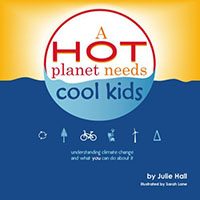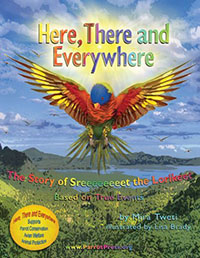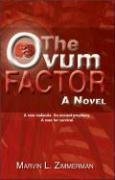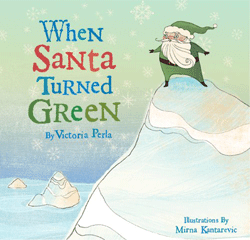
Getting to Scale is the second book so far that Swedish publisher Bookhouse Publishing translated and balanced out with tree plantings by Eco-Libris. They are doing great work over there and we encourage all our Swedish speaking readers to check them out.
How to structure your green or mission-driven business, so that you can grow and even possibly sell it one day, without compromising your ideals, beliefs and mission? How to fund your growth without finding out too late that your new investors are not at all interested in what you are doing for the environment or society, but only at the financial bottom line? While Getting to Scale is not a “how to” guide, it describes a wide variety of case studies that illustrates key findings. It is based on extensive in-depth interviewes with dozens of CEOs and founders of mission driven businesses such Ben & Jerry's Stonypoint, American Apparel, and many others.
As a co-founder of Eco-Libris, and someone who spends a sizable proportion of his day involved in the operation of a mission driven green business, I found this book useful and right on. Although it deals with “rich” problems, which I can only dream about having, it did give me food for thought, and also validated some of the things already in place. Will it help us get the millionth tree planted? Time will tell...
However I was thrilled to be able to present author Jill Bamburg, who is also the dean of the MBA program at the Bainbridge Graduate Institute, with questions on this fascinating topic.
Q: “Getting to Scale” was published in 2006, while 2007 was the year that, at least according to some parts of the media, brought the environmental movement to the folds of the mainstream, even if only temporarily (crossing fingers). Do you think there was any fundamental shift in the world of mission driven businesses since the book came out?
A: Great question. There has definitely been a huge upsurge of interest in green business, sustainability, and climate change since the book was published. As you say, these issues have definitely gone “mainstream” – which is to say that they have now been taken up by major corporations around the globe (or at least their PR departments!).
These businesses are now embracing the “business case” for undertaking environmental actions: cost savings, risk management, and revenue opportunities.
At the same time, there is also increased interest in the kinds of businesses I was writing about – that is, those that are fundamentally mission-driven, as opposed to profit-driven – on the part of two important demographic groups: young people who are just beginning their careers in business and mid-career or retiring baby boomers who are looking for ways align their work with their values.
So yes, I do think there has been a shift in the business world since the book came out.
Q: Your book is about the issues mission driven businesses have to deal with when they need to grow, sustain growth and/or sell their business, and you give many examples. Since then there were several high profile business deals that I assume would have made it into the book had they been done previously. For example the sale of Burt's Bees to Clorox, Coca Cola's investment in Recyclebank and JP Morgan acquisition Climate Care, the UK based carbon offset company. Do these recent cases validate your past conclusions, or did things change?
A: Another good question. In this case, I don’t think things have changed much -- with one exception, which I’ll talk about in a minute.
The reason I wrote the book initially was that I observed a disturbing pattern in the sale of socially responsible businesses to larger financially driven firms. I was concerned that there might be something inherently wrong with the model of socially responsible businesses that was causing these sales to happen. I set out to find out whether that was true by looking at socially responsible businesses that had grown successfully without selling out to larger players.
The most recent wave of sales is simply a continuation of what I observed in the earlier period. The one exception is that the mainstream market for “green,” organic and “alternative” products has grown, making these more attractive acquisition targets for mainstream players.

Q: Another relatively new development that we begin to see with such businesses discussed are mergers, such as the case of Zipcar and Flexcar. Do you see it as growth or more of a survival mechanism? How do mergers fit the models you present in the book?
A: I think that the Flexcar-Zipcar merger, and others like it, are both growth and survival strategies stemming from very traditional business imperatives. Both car-sharing companies needed capital to grow and expand their market coverage. Rather than seek to stay independent and fight head-to-head in the marketplace, or be acquired by larger, better capitalized firms in other businesses, they chose to join forces and develop the US market for car-sharing.
Many other businesses that seek to grow (or survive) don’t have the luxury of a merger with another like-minded company. The circumstances have to be right and the size of the final entity has to be large enough to meet the challenges of distribution and competition.
Q: These days it seems that there are more and more “green business” networking events, forums and circles. Although these places are a great place for mission driven businesses to interact and support one another, one can't help but also feel a certain buzz that sometimes looks like entrepreneurs creating green businesses with the idea of being bought out by a mainstream brand like Clorox as a goal in mind. Is your book also suitable for such entrepreneurs?
A: I think that some of the ideas in my book will apply to people who are building businesses to sell, but they are not my target audience. I wanted to help the business owners who are trying to remain independent and in control of the values of their companies.
Q: Is it now more easy or more difficult for a mission driven business, compared to the previous periods?
A: There are a couple of things that may make it a little easier than it has been in the past: 1) a shift in the mainstream market interest toward greener, healthier products and lifestyles; 2) an increase in the talent available to make these businesses successful; and 3) some new thinking in the area of hybrid corporate forms that may better support mission-driven businesses.
On the other hand, the fundamentals of business have not gotten any easier. It’s hard to build a successful business of any sort – and it’s harder still to build one that is as committed to environmental and social values as it is to financial success.
Q: Many of our readers are involved in the book industry, either as authors, booksellers or in publishing. Do you have any insight into the book business from a green or mission driven perspective? Any advice on how to navigate the market?
A: Just some great examples from the North American marketplace: Berrett-Koehler (my publisher), New Society Publishers on Gabriola Island, British Columbia, Chelsea Green in Vermont, and Raincoast Books in Vancouver, British Columbia (my Canadian distributor).
Once again, it’s hard to be successful in business. It’s even harder to be successful in the book business. And harder still to be successful in the mission-driven book business. All the companies I’ve mentioned have great lists, great values, and inspiring stories.
Q: What has been the feedback for the book so far from the business community or from Bainbridge students and graduates?
I’ve gotten good feedback on the book from a lot of people who have read it. They find the stories inspiring and the insights useful. No millionaires to report yet, however.
The same is true at the Bainbridge Graduate Institute, where I serve as Dean of the MBA Program. Our program is providing adult students with an MBA in Sustainable Business that will give them a leg up on aligning their work with their values. We’re six years into the venture. Still no millionaires, but a lot of successful change agents in business.
Title: Getting to Scale: Growing Your Business Without Selling Out
Link: http://www.bkconnection.com/ProdDetails.asp?ID=9781576754160
Author: Jill Bamburg
Swedish Publisher: Bookhouse Publishing
American Publisher: Berrett-Koehler Publishers
Publication Date: August 1, 2006
Pages: 174 pages
Yours,
Eylon @ Eco-Libris
Eco-Libris: plant a tree for every book you read!















